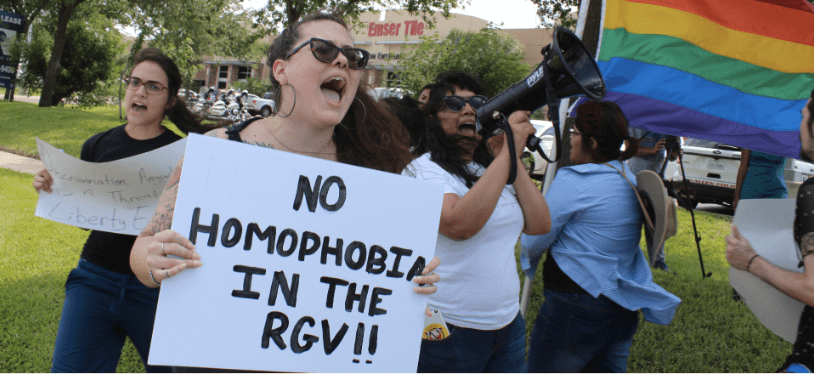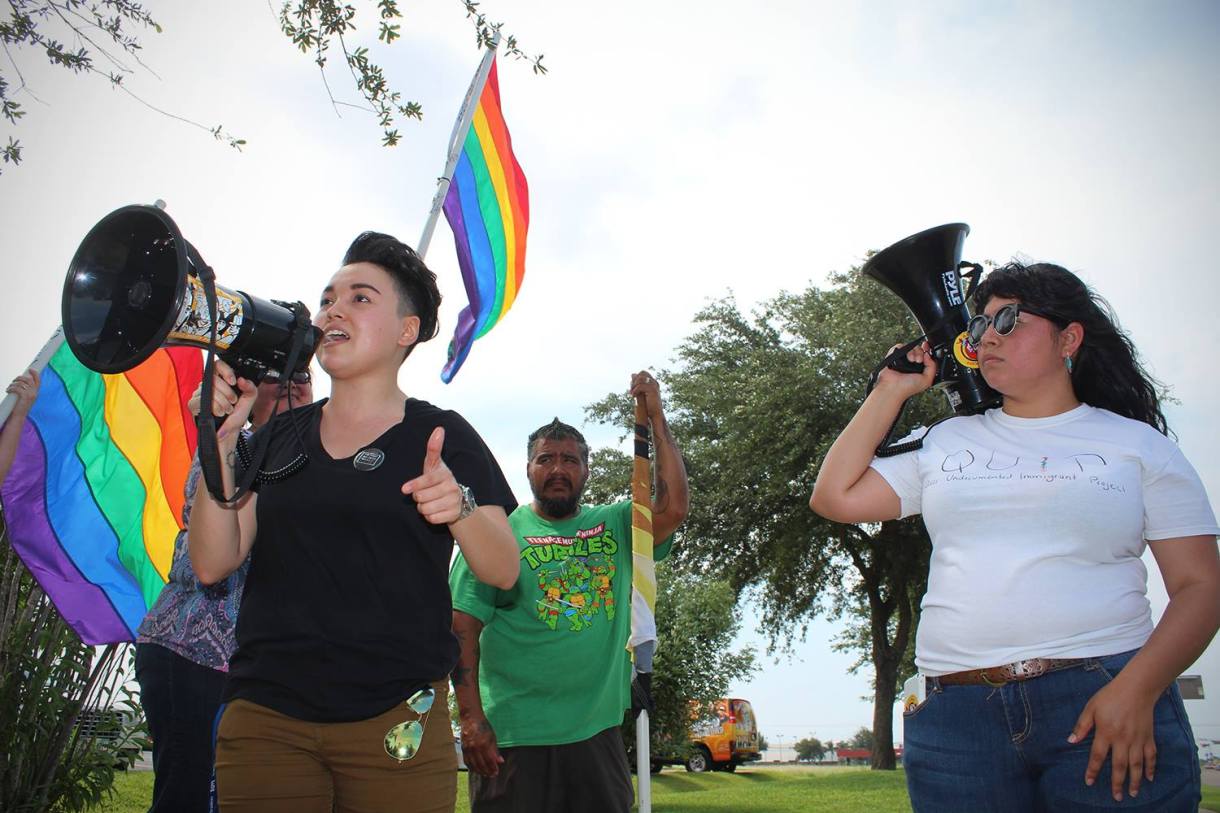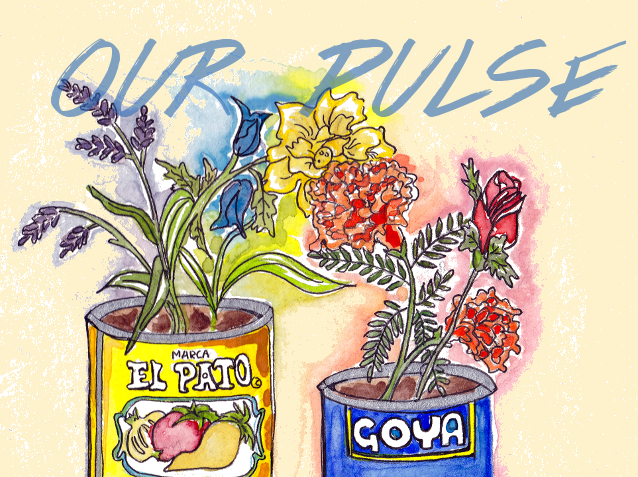Welcome to Autostraddle’s queer Latinx essay series: Our Pulse. In honor of celebrating Latinxs during Hispanic Heritage Month, Autostraddle curated a collection of essays by lesbian, bisexual, queer and trans Latina and Latinx writers to showcase our experiences, our pulse.
I looked down our guapango line and realized why the night was so special. We were in the middle of Queerceañera, a fundraiser for the queer people of color conference Aquí Estamos, and normally I don’t expect to have fun at events I help organize, but this was a first.
We went on into the hot, summer night with our tejano line-dancing, old and young folks sweating as we circled around the dance floor, and I felt as whole as I have managed to in almost nine years. Finally I got to be unapologetically queer amongst this familia that came together in the face of rejection from the homes we came from or by the systems that governed us in the US/Mexico border community that is the Rio Grande Valley.

Aquí Estamos organizers with trans activist Isa Noyola
I had learned to compartmentalize myself when I was amongst my blood family, due to their rejection of my queerness when I was outed when I was 16. After the fights and tears and trips to the priest, I accepted that maybe harmonious family just wasn’t going to be a thing for me if I was going to try to be my authentic self. Even now, at 24, we skirt around topics that neither of us want to face, a dance we’ve learned and have become accustomed to.
But here I was dancing with mi familia, maybe not the people who raised me, but definitely people who have helped me grow.
In Latinx culture, our families become something that grounds us. Unfortunately, if our families reject our queerness, we start to look at these ties as chains that become binding. Turning your back on them is an option, but not usually one that is made easily. And if you’re financially dependent on your family, as so many of us are, it becomes a question of being yourself or getting to eat or having access to medical care or having somewhere to live.
Fortunately for queer folks in the Valley, we’re getting organized so that we have to stop making these choices. Aquí Estamos, the conference, can be described as a byproduct of what several years of queer and intersectional organizing in the Valley has created.
The Rio Grande Valley, the South-most part of Texas, is on the border of Mexico and sees immigrants from all parts of Latin America come through. In some cases, the RGV is the first stop on an immigrant’s trip before they get to another part of the US. In other cases, due to government checkpoints that surround the areas north of the Rio Grande Valley, we see folks becoming stuck in our area. This can lead to a lot of understandably ill feelings towards a place that many people, including myself, have decided to make their homes.
Aquí Estamos was born out of this idea that instead of criticizing the endless list of reasons that make the Valley a bad place for a queer immigrant, we can try to make it better for all of us. At first, this meant through a free annual queer people of color conference, but we realized that our movement needs to happen year-round. We also recognized that the only approach was a holistic one, which meant that if we didn’t find solutions that encompassed a person’s entire identity, then we had to go back to the drawing board and try again.
“Many folks who turn to Aquí Estamos, statistically, have a lot of issues,” said Alex B, an Aquí Estamos organizer. “Living on the frontera it’s almost unavoidable. Any organization that is attempting to do meaningful work in the Valley or somewhere like the Valley, will not be successful without an intersectional approach. Cultural identities, immigration status and citizenship, gender, income — everybody has different privileges and oppressions that they face.”

Aquí Estamos members at a Greg Abbott protest
Personally, working with Aquí Estamos was my attempt at redemption for all the years I had spent as a teenager harboring resentment towards my home. Some of that resentment was understandable, since the RGV was where my traumas had originated, but I realized later that organized Catholic religion bore most of the responsibility for why my queerness was rejected by my blood-kin. I figured that there might be another queer 15-year-old running around my hometown who might have it worse than I did, and instead of telling them that they can eventually move away, which might be true only if they have the means or papers to do so, we can try to build something meaningful together.
This year was the second conference, and we saw attendance double within a year. More importantly, the conference, held at South Texas College’s Cooper Center, was free and accessible for the entire community, and was funded entirely by the community itself. Fundraisers like Queerceañera, a take on the traditional quinceañera or 15th birthday party, or online donation drives saw members of the community throw their resources together so that spaces like Aquí Estamos could exist.
Besides Aquí Estamos, which is relatively new, organizations that already existed have been stepping up to the plate of trying to alleviate the issues created by rampant poverty that faces our queer, border community.
The Valley Aids Council, which is the only HIV outpatient agency serving the 1.3 million that makes up the RGV are now seeing about four new patients every week due to the rise of HIV infection along the border. Their staff is also representative of the population they’re serving, including HIV advocate, educator and writer Adrian Castellanos who started creating profiles on dating apps like Grindr and Tinder to educate other users in the RGV about HIV prevention after being diagnosed with the virus himself.

Aquí Estamos organizer Dani Marrero and Sam Herrera at a protest
“To give someone that news that quite literally changes their life takes a huge toll but if I can help them in any single way — be it with physical health, mental health, emotional support — I’m gonna try,” Castellanos said at his keynote address at Aquí Estamos 2016 in August. “I remember how badly I needed someone in my time of crisis. And how I didn’t have someone to turn to, someone that truly understood what I was going through.”
Other organizations like Pride Home are a direct response to a need seen amongst the queer community in the RGV for emergency housing. Made up of a group of advocates and members of the community to create a shelter for LGBTQ youth in the RGV, it would be the only LGBTQ shelter since there currently isn’t any in the four counties that make up this area. RGV Trans Support is also a grassroots support group made up of trans and gender variant persons throughout the RGV. With a tight-knit online community and physical meetings, this organization was a direct response to the trans community’s need for accessible mental health services in our largely medically underserved area.
There are also organizations that don’t have queer and trans-centric missions but are using the platforms they do have to help bridge gaps between the rest of the community with queer and trans issues. Local leaders and allies from the National Latina Institute for Reproductive Health, Las Poderosas, have hosted LGBTQ 101 events in Spanish for families who might have questions about their queer and trans kids, an ongoing project that helps us bridge generational gaps and prove that homophobia is not an inherent quality of Latinx culture.
While we’re working on creating these formal spaces, the ability to find housing or healthcare for people without actual formal resources is a marker of how tight and scrappy our community can be when we need each other, and a characteristic of what organizing among queer and trans Latinxs is and needs to be.
“It is very beneficial that all these organizations hold each other up, because we hold each other accountable and we also encourage and challenge each other, and we grow with each other to create an even better network to better serve the community here in the Valley,” said Alex B. “You find your gente, and you start building your family of sorts. It doesn’t completely erase any struggles that we face, but it certainly makes them much simpler to bear when you know you have someone to lean on and someone to lean on you.”
We’ve started to heal the wounds left by rejection from families and fill in the holes left by government neglect and financial stability. We show up for one another when we need it porque somos familia, and that’s just what we do.




Beautiful, beautiful, beautiful. I’m so glad this organization exists. Thank you.
And anyone protesting Greg Abbott is doing the queer lord’s work. Praise hands to that.
Thanks for sharing, and for the work you do.
Empowering and inspirational voices.
This is great ~ really loved reading about the amazing work you’re doing!
OMG love it when you write about the valley!
Tan orgullosa of the wonderful work you’re doing for the community ❤️????
Thanks for this Erika and all the work that you and your fam puts in. Super important and super necessary.
Thanks y’all! I’m glad you enjoyed reading about this weird, magical place. <3